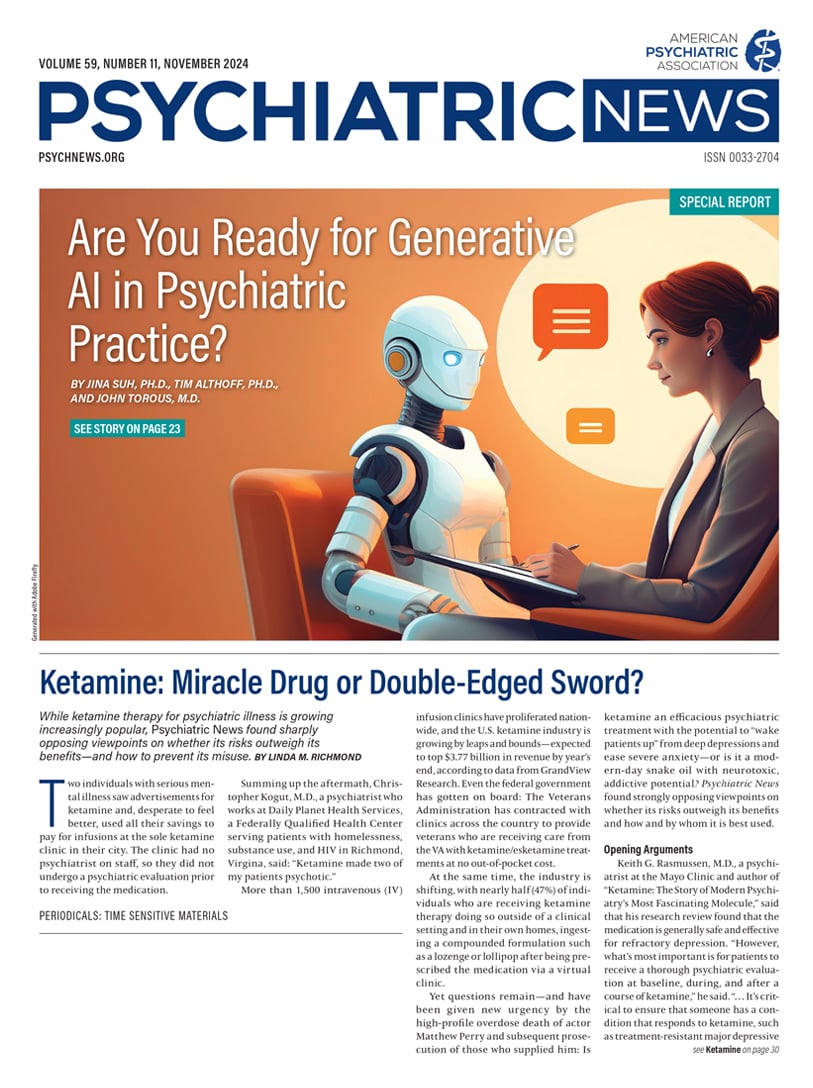Atypical antipsychotics worked better than traditional mood stabilizers when treating youth with acute mania or mixed episodes of bipolar disorder, according to a
network meta-analysis published in the
Journal of the American Academy of Child and Adolescent Psychiatry.
“The findings were somewhat surprising,” said co-author Christoph U. Correll, M.D., professor of psychiatric neuroscience with the Institute of Behavioral Science at Northwell Health’s Feinstein Institutes for Medical Research. Previous research from Correll and others has found that atypical antipsychotics have equal efficacy as mood stabilizers for acute or mixed episodes in adults.
In their new meta-analysis, Correll and colleagues theorized that these latest results “may be explained by the fact that antipsychotics also target symptoms related to a comorbid neurodevelopmental disorder, such as oppositionality, irritability, and emotional and behavioral dysregulation.”
However, the use of antipsychotics in youth must be weighed against “worrying” side effects, researchers noted; the study linked the medications to more sedation, weight gain, metabolic issues, and hyperprolactinemia—increased levels of the hormone prolactin—in youth than other treatments.
“There needs to be a balancing act between efficacy and safety,” Correll told Psychiatric News. “Mania is a very acute and severe condition that responds well to pharmacological treatment, generally in three to four weeks…. However, the acute response is only the beginning of the story; we then need relapse prevention.” Although lithium appears to be safest and work best as a long-term treatment for adults, Correll said more study of long-term treatments are needed in children, for whom evidence is sparse.
Experts in the treatment of pediatric mood disorders told Psychiatric News that taking a long-term view of treatment and symptoms may be more important than comparing the immediate potency of individual anti-manic agents.
About half of individuals with bipolar disorder will develop the illness before age 13, and such early-onset bipolar is associated with a higher risk of suicidality and a more severe, chronic illness course.
The Study: Drilling Down
Correll and colleagues included 18 studies that involved only youth age 18 or younger who had mania or mixed mania and had been diagnosed with bipolar I disorder. The studies included 2,844 youth and compared one or more atypical antipsychotics (aripiprazole, asenapine, olanzapine, quetiapine, risperidone, or ziprasidone) or mood stabilizers (lithium, oxcarbazepine, topiramate, or valproate) with each other or a placebo. They assessed efficacy, tolerability, and safety outcomes.
Researchers compared antipsychotics and mood stabilizers as a class as well as the individual agents. All six antipsychotics outperformed placebo at reduced manic symptomology, and most showed higher treatment response than placebo, except for ziprasidone.
A main finding of the study was that risperidone worked best at reducing manic symptoms over other treatments studied, particularly for youth over age 12; on the downside, risperidone was also associated with significant increases in prolactin and glucose levels compared with placebo. Among the other antipsychotics studied, ziprasidone was less associated with metabolic abnormalities, but unfortunately, it also had lower efficacy.
Among mood stabilizers, only lithium induced higher treatment response than placebo.
One limitation of this meta-analysis is that the included studies were only five weeks in duration on average, so the results cannot reveal medium- or long-term patient outcomes. “This is important, because effective treatments for the acute phase of the illness may not be the best option for maintenance treatment and vice versa,” researchers wrote.
Overall Burden of Symptoms
“The question the study asks is, what agent is more effective for acute mania, but when the mania is over, patients have to keep taking the medication,” said Benjamin I. Goldstein, M.D., Ph.D., director of the Centre for Youth Bipolar Disorder and professor of psychiatry and pharmacology at the University of Toronto. “Someone might get better from a medication for mania, but then not be able to tolerate it month after month…. You wouldn’t want to start a patient on a medicine that’s a little better for mania, only to have to switch soon after.”
Rather, Goldstein believes clinicians should consider a patient’s overall burden of psychiatric symptoms across domains and over the long term, such as depression, anxiety, or insomnia, when selecting an anti-manic agent. For example, the antipsychotic quetiapine, although less potent against mania, might be the best choice for patients with a high degree of insomnia and anxiety because it is so beneficial for those conditions.
Another limitation of the meta-analysis: Goldstein noted that the studies involving antipsychotics often had larger sample sizes than those involving lithium. These differences might have influenced the study’s conclusions, given the disparities in statistical power across studies. “The whole field is understudied and under-resourced,” he said.
Moreover, there were a high number of dropouts among those taking lithium. “Initiating patients on lithium involves greater clinician involvement and skill to help patients, especially adolescents, successfully navigate the short- and long-term side effects,” Goldstein said. Yet, patients who stay on the medication often experience greater efficacy.
For example, lithium-induced hair loss and acne can be particularly upsetting to teens and cause dropouts, but they are actually harmless; Goldstein also noted that nausea or dizziness typically dissipate after patients adjust to the medication.
Robert L. Findling, M.D., M.B.A, distinguished chair in clinical and translational research and chair of psychiatry at Virginia Commonwealth University School of Medicine, takes a slightly different view of this study’s results than its authors: “In the treatment of acute mania in children and adults, atypical antipsychotics have a more powerful, more rapid onset of action than lithium,” he said.
Although lithium is also effective in treating acute mania, Findling said, its effect size is often smaller and delayed in young people—taking about six to seven weeks.
“It is not uncommon for youth to gain a lot of weight on an atypical antipsychotic,” he added, so for those patients who do not initially present in acute duress or crisis, it makes sense to initiate lithium from the start or switch them to it, because lithium can offer long-term benefit without the same metabolic effects.
“Ultimately, it’s important to know the data so we can help patients and families make the right decision,” Findling said. ■


